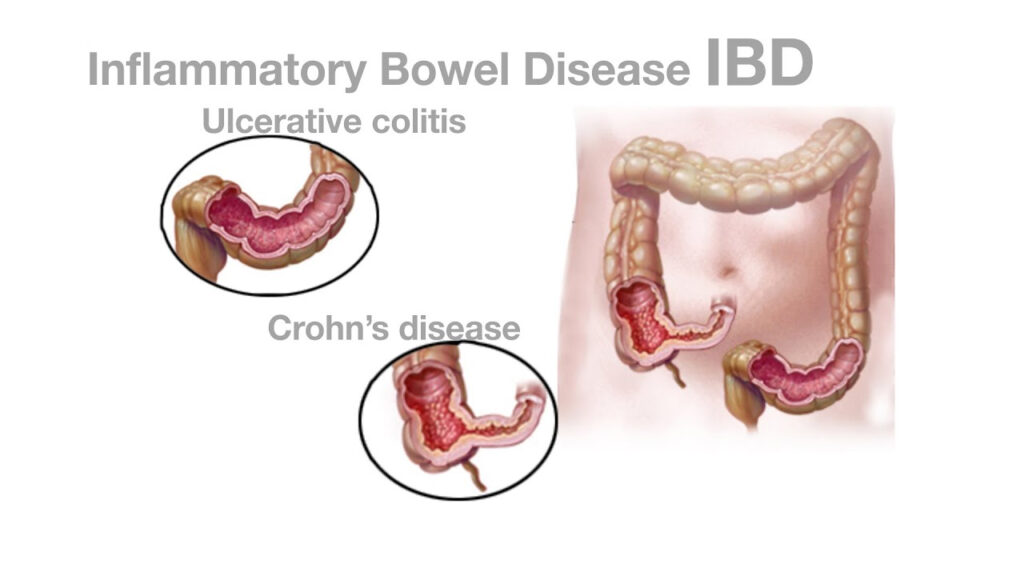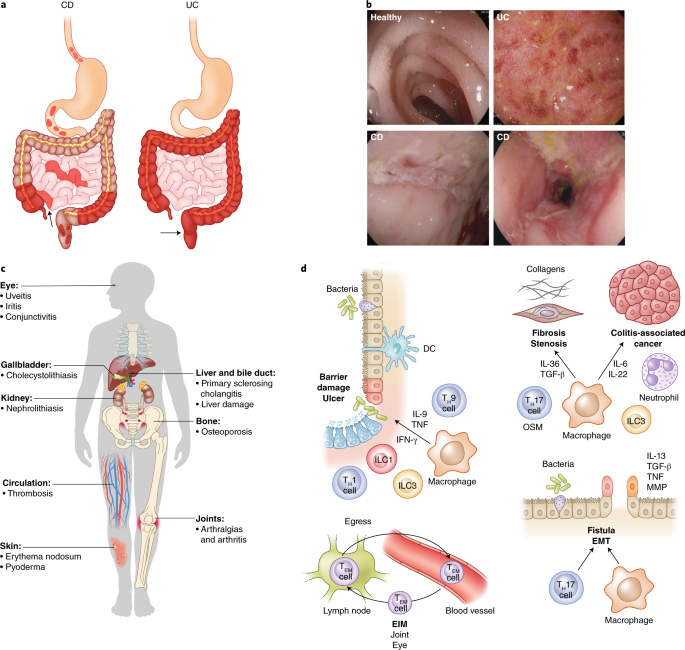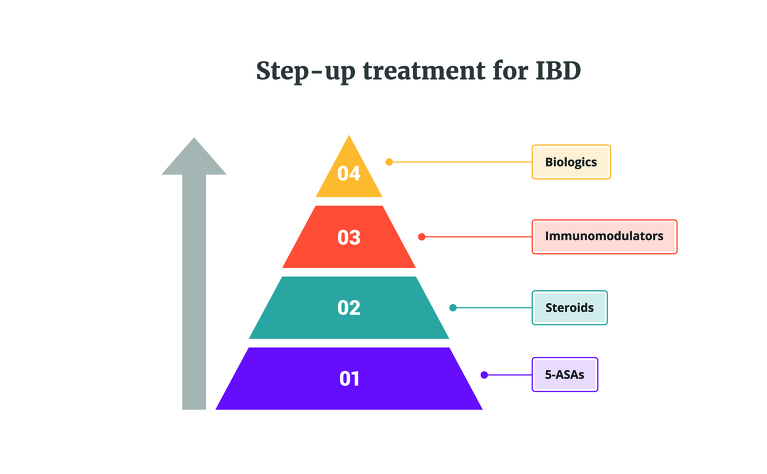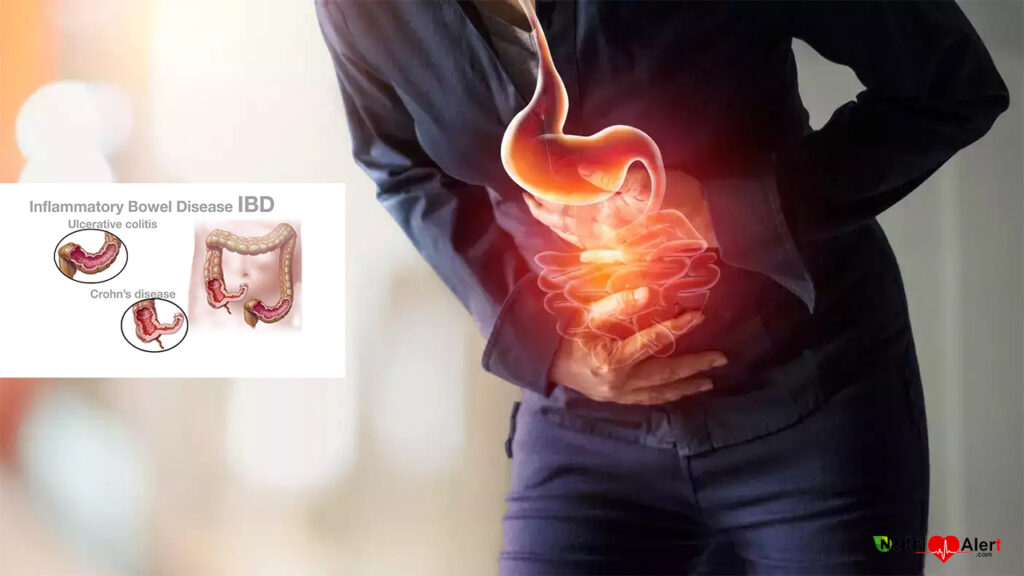Inflammatory Bowel Disease: What Is It? Parts of the gut (bowel) that suffer from IBD (Inflammatory Bowel Disease) become inflamed and bloated (inflammation). As a chronic condition, it persists for a long time or recurs frequently.
IBD can be classified as either Crohn’s disease or ulcerative colitis. These illnesses share a lot in common, yet there are also some key differences:
From the mouth to the antrum, the gastrointestinal system can be affected by Crohn’s disease (where poop comes out). The entire gut wall is damaged by the Crohn’s disease inflammation.
Only the large intestine experiences ulcerative colitis (the colon). It damages the inner lining of the colon, causing sores known as ulcers.
Foods that affect your Brain and reduce your intelligence | Breast cancer patients can choose a smaller surgery for cure
What are the symptoms and signs of IBD (Inflammatory Bowel Disease)?

Inflammatory bowel disease is most frequently characterised by abdominal discomfort and diarrhoea. Additional signs include:
- weight loss
- low energy
- blood in the toilet, on toilet paper, or in the stool (poop)
- fever
Other issues brought on by IBD include rashes, eye issues, joint discomfort and arthritis, and liver issues. Children might not develop as quickly as other children their age and might experience puberty later than usual.
IBD, or inflammatory bowel disease, has a known cause
It is unclear what causes Inflammatory Bowel Disease (IBD) specifically. Inflammation in the gastrointestinal tract is probably brought on by a combination of genetics, the immune system, and something in the environment. Stress and diet may exacerbate symptoms but are unlikely to be the primary causes of inflammatory bowel disease.

IBD frequently occurs in families. However, not all people with Inflammatory Bowel Disease have a family history of the condition. Although IBD can occur at any age, it is typically recognised in adolescents and young adults.
IBD (Inflammatory Bowel Disease) Diagnosis Methods
Blood tests, stool (poop) tests, and X-rays are used in combination by doctors to diagnose IBD. There may also be additional testing, including MRI and CT scans.
A faeces sample will be examined by doctors to look for blood. They can also do an upper endoscopy or a colonoscopy to examine the interior of the digestive tract using a long tube and a small camera. The anus is where the tube enters during a colonoscopy. A doctor inserts a tube down the patient’s throat to perform an endoscopy. The colon’s wall may have ulcers, bleeding, or inflammation, which the doctor can see. The doctor may do a biopsy while performing the procedure, removing small samples for processing in a lab.
Treatment for Inflammatory Bowel Disease
Treatment for inflammatory bowel disease includes medication, dietary modifications, and occasionally surgery. The purpose of treatment is to alleviate symptoms, stop secondary issues and flare-ups, and perhaps even repair the inflamed intestines.

A physician might advise:
- anti-inflammatory medication to lessen inflammation
- anti-inflammatory drugs to stop the immune system from producing inflammation
- biological remedies to stop the inflammatory proteins
- Nutritional therapy to allow the bowel to repair
Antibiotics may be prescribed by doctors to treat or prevent infections. IBD patients should never take antidiarrheal medication without first consulting their doctor.
Before beginning therapy, it’s crucial that your child have a TB test and receive all advised vaccinations because some medications can make it more difficult to fight infections.
People with IBD may find it challenging to consume the necessary amounts of calories and nutrients due to reduced appetite, diarrhoea, and poor nutrition absorption. Children with IBD should consume a variety of foods, lots of water, and stay away from foods that aggravate their symptoms. Some children might require calcium, vitamin D, or vitamin and mineral supplements. Children who are not developing normally may require special formulations to increase nutrients and calories.
If: A person with IBD may require surgery
- a hole forms in the bowel
- the colon becomes obstructed
- Symptoms that cannot be treated,
- include bleeding that cannot be stopped
Colon cancer, which is linked to chronic inflammation, is at risk in IBD (Inflammatory Bowel Disease) patients. Consequently, patients ought to begin having a colonoscopy every year roughly 10 years after being diagnosed.

